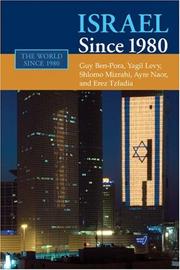| Listing 1 - 8 of 8 |
Sort by
|
Book
ISBN: 0814753353 9780814753354 9780814738337 0814738338 9780814753347 0814753345 Year: 2012 Publisher: New York : New York University Press,
Abstract | Keywords | Export | Availability | Bookmark
 Loading...
Loading...Choose an application
- Reference Manager
- EndNote
- RefWorks (Direct export to RefWorks)
2012 Winner of the Shapiro Award for the Best Book in Israel Studies, presented by the Association for Israel StudiesWhose life is worth more?That is the question that states inevitably face during wartime. Which troops are thrown to the first lines of battle and which ones remain relatively intact? How can various categories of civilian populations be protected? And when front and rear are porous, whose life should receive priority, those of soldiers or those of civilians? In Israel’s Death Hierarchy, Yagil Levy uses Israel as a compelling case study to explore the global dynamics and security implications of casualty sensitivity. Israel, Levy argues, originally chose to risk soldiers mobilized from privileged classes, more than civilians and other soldiers. However, with the mounting of casualty sensitivity, the state gradually restructured what Levy calls its “death hierarchy” to favor privileged soldiers over soldiers drawn from lower classes and civilians, and later to place enemy civilians at the bottom of the hierarchy by the use of heavy firepower. The state thus shifted risk from soldiers to civilians. As the Gaza offensive of 2009 demonstrates, this new death hierarchy has opened Israel to global criticism.
Civil-military relations --- Casualty aversion (Military science) --- Aversion, Casualty (Military science) --- Bloodless warfare --- Strategy --- Israel. --- I.D.F. --- IDF --- Israel Defense Forces --- Israeli Defense Force --- Israeli Defense Forces --- Tsahal --- Tzahal --- Zahal --- צבא --- צבא הגנה לישראל --- צה׳׳ל --- ישראל. --- Haganah (Organization) --- Regulations. --- Israel --- Military policy.

ISBN: 0585076812 9780585076812 9780791434291 079143429X 9780791434307 0791434303 9781438410678 1438410670 079143429X 0791434303 Year: 1997 Publisher: Albany State University of New York Press
Abstract | Keywords | Export | Availability | Bookmark
 Loading...
Loading...Choose an application
- Reference Manager
- EndNote
- RefWorks (Direct export to RefWorks)
Trial and Error offers a unique exploration of the link between Israel's military policies and its ethno-class relations of power that has theoretical implications elsewhere. The book denounces the commonly accepted view that Israel's military policies were crafted merely as a direct and inevitable response to neighboring Arab states' hostility. Instead, Yagil Levy shows that Israel's security interests were also determined by the social interests of a rising middle class comprised of Jews of European descent. Because of the protracted state of war, this class achieved dominant status over other groups. As a result, a strong link was created between increasing inegalitarianism in Israeli society and missed opportunities to adopt more moderate foreign policies at crucial crossroads up to the 1980s. Paradoxically, however, as war benefits elevated the consumerist lifestyle of the middle class, the burden of war became less appealing to it. Levy argues that this and other social constraints, along with limitations imposed by the international system, played a focal role in channeling Israel's policies toward the 1990s' peace process.
Israel --- Arab-Israeli Conflict --- Social Classes --- Social Conflict --- War And Society --- Political Science --- History --- Social Science --- Arab-israeli conflict --- Social classes --- Social conflict --- War and society --- Political science --- Social science
Book
ISBN: 1503610349 9781503610347 9781503606821 Year: 2019 Publisher: Stanford, California
Abstract | Keywords | Export | Availability | Bookmark
 Loading...
Loading...Choose an application
- Reference Manager
- EndNote
- RefWorks (Direct export to RefWorks)
Modern democracies face tough life-and-death choices in armed conflicts. Chief among them is how to weigh the value of soldiers' lives against those of civilians on both sides. The first of its kind, Whose Life Is Worth More? reveals that how these decisions are made is much more nuanced than conventional wisdom suggests. When these states are entangled in prolonged conflicts, hierarchies emerge and evolve to weigh the value of human life.Yagil Levy delves into a wealth of contemporary conflicts, including the drone war in Pakistan, the Kosovo war, the Israeli-Palestinian conflict, and the US and UK wars in Iraq and Afghanistan. Cultural narratives about the nature and necessity of war, public rhetoric about external threats facing the nation, antiwar movements, and democratic values all contribute to the perceived validity of civilian and soldier deaths. By looking beyond the military to the cultural and political factors that shape policies, this book provides tools to understand how democracies really decide whose life is worth more.
Casualty aversion (Military science) --- War casualties --- Military policy. --- Defense policy --- Military readiness --- Military history --- Sociology, Military --- War --- National security --- Casualties, War --- War victims --- War wounds --- Aversion, Casualty (Military science) --- Bloodless warfare --- Strategy --- Government policy. --- Political aspects --- Casualties --- Casualties (Statistics, etc.) --- body count. --- casualty sensitivity. --- collateral killing. --- force protection. --- legitimacy of sacrificing. --- legitimacy of using force. --- risk taking. --- risk transfer.
Book
ISBN: 1626379432 1626379394 9781626379398 Publisher: Lynne Rienner Publishers
Abstract | Keywords | Export | Availability | Bookmark
 Loading...
Loading...Choose an application
- Reference Manager
- EndNote
- RefWorks (Direct export to RefWorks)
What leads a democratic government to use military force to counter a domestic or external threat? How does it legitimize this mobilization to its citizenry? And what is the significance for civilian control of the military? The authors of Mobilizing Force draw on case studies from around the world to systematically examine these critical questions, exploring the interrelationships among security threats, the militarization of security policy, and democratic accountability.
Civil-military relations - Cross-cultural studies --- National security - Cross-cultural studies --- Militarization - Cross-cultural studies --- Civil-military relations --- Militarization --- National security --- POLITICAL SCIENCE / Security (National & International). --- National security policy --- NSP (National security policy) --- Security policy, National --- Economic policy --- International relations --- Military policy --- Militarisation --- Organizational sociology --- Military and civilian power --- Military-civil relations --- Executive power --- Sociology, Military --- Military government --- Government policy
Multi
ISBN: 9781626379435 9781626379398 1626379394 Year: 2021 Publisher: Boulder (Colo.): Lynne Rienner,
Abstract | Keywords | Export | Availability | Bookmark
 Loading...
Loading...Choose an application
- Reference Manager
- EndNote
- RefWorks (Direct export to RefWorks)
"Considering a wide range of democratic states, explores the interrelationships among perceived security threats, the militarization of security policy, and democratic accountability"--
Political sociology --- Politics --- Civil-military relations --- National security --- Militarization
Multi
ISBN: 9780814753354 9780814753347 Year: 2012 Publisher: New York, N.Y. New York University Press
Abstract | Keywords | Export | Availability | Bookmark
 Loading...
Loading...Choose an application
- Reference Manager
- EndNote
- RefWorks (Direct export to RefWorks)

ISBN: 9780521671859 9780521855921 9780511756153 9780511388859 0511388853 0511387865 9780511387869 9780511385049 0511385048 0521855926 052167185X 0511756151 1107176875 9781107176874 0511383177 9780511383175 1281254495 9781281254498 0511386877 9780511386879 9786611254490 6611254498 0511381093 9780511381096 Year: 2008 Publisher: Cambridge: Cambridge university press,
Abstract | Keywords | Export | Availability | Bookmark
 Loading...
Loading...Choose an application
- Reference Manager
- EndNote
- RefWorks (Direct export to RefWorks)
Over the last quarter century, a radical demographic, economic and political transformation has been taking place from within Israel. Israelis are beginning to ask some fundamental questions about the country they live in and what it means to be an Israeli. This book, written by five Israeli academics, probes the changing nature of Israeli society over the last twenty-five years. It considers the deep rifts in that society caused by ethnic, cultural, class and religious divide. It looks at political and economic changes and how privatization has undermined the welfare state. It questions the role of the military in the light of the wider social and economic changes. Finally, and crucially, it asks whether new political initiatives can offer a realistic alternative to the inadequacies of recent governments. This is an informative account of Israel's recent past and the challenges it faces in the twenty-first century.
Israel --- Israël --- History --- Histoire --- Israël --- History. --- Social Sciences --- Political Science --- Israel - History - 1993 --- -Israel - History - 1967-1993
Book

ISBN: 9781626379435 Year: 2021 Publisher: Boulder
Abstract | Keywords | Export | Availability | Bookmark
 Loading...
Loading...Choose an application
- Reference Manager
- EndNote
- RefWorks (Direct export to RefWorks)
| Listing 1 - 8 of 8 |
Sort by
|

 Search
Search Feedback
Feedback About UniCat
About UniCat  Help
Help News
News